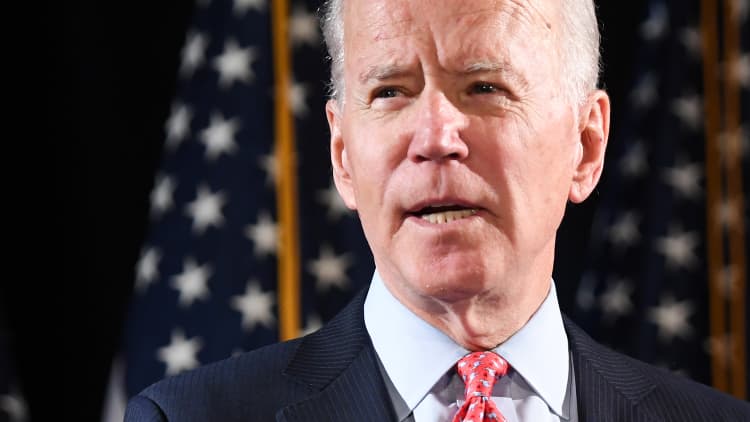Former Vice President Joe Biden and Sen. Bernie Sanders will face off on Sunday in the first one-on-one debate of the Democratic presidential primary, a key milestone in the 2020 race that will take place in the shadow of a raging public health crisis.
The rapid spread of COVID-19, the disease caused by coronavirus, has already re-shaped the race, absorbing a panicked nation's attention and throwing both Biden and Sanders off the campaign trail. Both men have ordered campaign staffers to work from home, canceled rallies and shifted campaign events to virtual formats.
Coronavirus also caused a last-minute change of plans for the debate itself. Originally scheduled to be hosted before a live audience in Phoenix, Arizona, CNN moved the event this week to Washington, where there will be no public spectators. Arizona, Illinois, Ohio and Florida will each host Democratic primaries on Tuesday.
The event will be broadcast on CNN and Univision from 8 p.m. to 10 p.m. ET on Sunday evening.
Even in the absence of a crisis, the debate between the two elder statesmen was likely to be an essential moment in the battle for the Democratic nomination that has now gone on for more than a year.
Biden and Sanders each represent competing factions of a deeply divided party that has struggled for more than a year to pick a nominee to take on President Donald Trump in November. The two men, both in their late 70s, are the final serious contenders left from a historically crowded and diverse Democratic field.
Rep. Tulsi Gabbard is also competing for the nomination, but the Hawaii lawmaker has not won delegates in any contest outside of American Samoa and polls at less than 3% in national surveys. Gabbard has not qualified for a debate since November.
Biden, the face of the party's moderate wing, is once again the front-runner for the nomination after temporarily losing that status after finishing outside the top three in Iowa and New Hampshire and in a distant second place in Nevada.
The former vice president found his turnaround in South Carolina, where black voters powered him to a dominant victory. In a whirlwind, Biden picked up endorsements from vanquished rivals ahead of Super Tuesday, which voted just three days later.
Biden emerged from Super Tuesday with a strong delegate lead, notching victories in Virginia, North Carolina, Alabama, Tennessee, Oklahoma, Arkansas, Texas, Minnesota, Maine and Massachusetts.
Sanders, the only other candidate to win a state on Super Tuesday, effectively dispatched with Sen. Elizabeth Warren, the other main progressive candidate.
Sanders carried the biggest delegate prize of the night, California, as well as Vermont, Utah and Colorado, but failed to perform up to expectations in Texas as well as in several of the northeastern states, giving Biden a possibly insurmountable advantage.
Biden solidified his advantage a week later, defeating Sanders in Michigan, where the self-described democratic socialist had scored an upset victory four years before. In a sign of the race being all-but-over, Biden has expanded his lead in national polls to 20 points, the highest since he launched his campaign.
In a significant demonstration of the state of the race, Warren has not endorsed either candidate after dropping from the race, withholding support that could entrench Sanders as the progressive standard bearer.
Speculation grew after it looked like Biden would carry Michigan on Tuesday that Sanders would exit. But in an address in Burlington, Vt., on Wednesday, Sanders vowed to press on, saying he looked forward to the debate "with my friend, Joe Biden."
"And let me be very frank as to the questions that I will be asking Joe," Sanders said, before listing off a range of questions about health care, climate change, student debt and childhood poverty.
"Are you really going to veto a 'Medicare for All' bill if it is passed in congress?" Sanders asked, referring to comments Biden made on MSNBC earlier in the week.
With just two candidates on stage, Sanders will likely be able to direct the conversation to a greater degree than in past debates. Biden, who is likely to carry the nomination unless the race's trajectory changes dramatically, will be looking to defend his record and policy stances without creating too many headlines.
That could be a challenge for a candidate who typically performs better in one-on-one interactions with voters than on the national debate stage. But Biden, who has criticized the previous formats for being full of "one-minute assertions," may also welcome the chance to have more time to speak on a less crowded debate stage.
All-in-all, it would take something momentous to knock Biden from his position. Going into the debate Biden had won 854 delegates compared to Sanders' 701 as of Saturday, according to an NBC News tally, and the states yet to vote look likely to be in his favor.
Candidates must win at least 1,991 of a total 3,979 pledged delegates to be named the party nominee in July.



